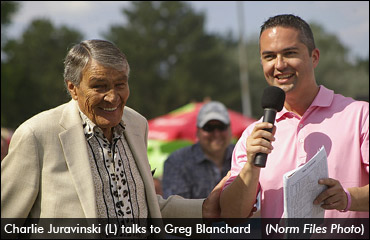 During Saturday's harness racing card at Flamboro Downs full of Ontario Sires Stakes and the Ellamony Classic, former track owner and soon-to-be Hall of Famer Charles Juravinski laid out a challenge for both the government and Ontario horse racing industry amidst these uncertain times.
During Saturday's harness racing card at Flamboro Downs full of Ontario Sires Stakes and the Ellamony Classic, former track owner and soon-to-be Hall of Famer Charles Juravinski laid out a challenge for both the government and Ontario horse racing industry amidst these uncertain times.
 In a trackside interview with Greg Blanchard prior to the Ellamony Classic, named in honour of the Juravinski-owned late great pacing mare, the 82-year-old philanthropist first offered up an update on his own health.
In a trackside interview with Greg Blanchard prior to the Ellamony Classic, named in honour of the Juravinski-owned late great pacing mare, the 82-year-old philanthropist first offered up an update on his own health.
"Well I got a cane and the reason I got a cane is because when you get to my age, things happen. Like the teenagers say, shit happens," he quipped.
But Juravinski quickly turned his focus to the plight of the horse racing industry, which is facing an uncertain future after the Ontario Liberal Government announced earlier this year that the profitable Slots at Racetracks program will end next March.
“In reference to the Ellamony Classic, I sincerely hope this isn't going to be the last one,” he said. “Going way back when, I really give credit to the former Premier Bob Rae. The industry was in trouble at that time. None of us could make any money. I don't think there'd be a track going today had it not been at that time Mr. Rae got the industry together. And it took a year to put the industry together. We formed OHRIA. With OHRIA we had a voice and the government listened, the government helped."
However, today's government has turned its back on Ontario horse racing leaving many baffled as to how the province will ultimately benefit from the decision to end the Slots at Racetracks program. The former revenue sharing agreement saw more then $1.1-billion in direct revenue stuffed into provincial coffers each year from slot machines housed within provincial racetracks. Horse racing's $345-million cut from the machines' revenue leads to $261-million in direct tax revenue for the Ontario government, a $2-billion annual economic impact on the province, and the employment of roughly 60,000 Ontarians.
The new OLG modernization plan seeks to bring in privitzed gaming companies to operate slots, leaving many questions on how the government will make a greater profit seeing as how they have already settled for a 25 per cent share of revenue from bingo halls with slots-like pull-tab machines, which is much less than their 75 per cent take with the slots program. The horse racing industry is still awaiting word on a previously announced transitional fund.
“With all due respect to the present government, I challenge them to bring out the numbers and let the industry see the numbers that they think they're going to get,” said Juravinski, who also offered up a challenge to horse racing to remain united with one voice through OHRIA. Juravinski also set forth a plan to inform and put pressure on the government to renegotiate a new partnership, offering up his help to do so.
“You get a strong voice through OHRIA and then you get every jurisdiction in the province of Ontario to have committees and assault -- I don’t mean physically -- their MPs, their MPPs and their counsel people because everybody shares in this industry," said Juravinski. "The jobs that are going to be lost are absolutely unbelievable. The money that it’s going to cost the government with welfare, health care, etc. will not be replaced and I’m suggesting to the horse racing industry to go for a compromise. Give the government some money back, renegotiate your contracts and let’s keep on trucking. I challenge the industry to take me up on that and if there would be somebody to lead us, I’ll throw myself into the fray to try to help.”

